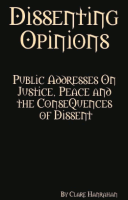Clare Hanrahan, who has been a war tax resister for almost thirty years and has been active in a number of other direct action projects and campaigns for peace and justice, has just released a book of speeches she has delivered over the course of her activism: Dissenting Opinions: Public Addresses on Justice, Peace, and the Consequences of Dissent.
In , Hanrahan “decided to break the deadly habit of paying for war” by getting below the tax line. “Since then,” she says, “my life has been an experiment in revolutionary poverty.”
It is not just our federal taxes that fuel war, but our lifestyles of waste and habitual consumption. This privilege that we maintain on the backs of the destitute of the world is upheld by the Pentagon and its deadly force.
I live on the economic edge, not with the destitution of the oppressed, but as a liberating choice. I’ve survived half a century, I’ve raised a fine daughter. I’m a writer and a gardener, and I get around town on my bicycle. I’m self-propelled and self-employed. And in the spirit of Emma Goldman, I dance at every chance.
When she spoke to the assembled activists at the “A Day Without the Pentagon” action, she didn’t waste her time excoriating the government and the military, but directed her words to the peace activists and groups whose complacency allows the Pentagon to get away with what it does:
As we gather here today to block the doors to the Pentagon… remember that there are people working inside this building who truthfully feel they are laboring in service of peace, ensuring our freedom to gather here and register our dissent. As we attempt to block the doors to their workplace, the source of their livelihood, as we ask that they stop participating in this business of death, I must ask this: Are we also willing to take on the risks of peace?
Are we willing to risk our economic privilege to obstruct this business of death?
…
…the truth is: we are all responsible for the militarism that is crushing the world, defiling the good earth, raining death on countless innocents, targeting not the dangerous leaders whom we fear, but the women and children, the old and infirm, as well as the soldiers. All fall victim to American weapons of mass and indiscriminate destruction.
It is our duty to withdraw our cooperation, to withhold our support.…
…
How long, war-tax payers, will you persist in this deadly submission?
Leo Tolstoy has said, “The freeing of people from servitude, from ignorance, cannot be obtained by revolution, syndicates, peace congresses… but simply by the conscience of each one of us forbidding us to participate in violence and asking in amazement: Why are you doing that?”
We peace seekers show more fear of the IRS and its threat to our property and privilege than willingness to take even a modest financial risk in support of peace. And many of us who find employment within our own movement are faced with the dilemma of having our peace organizations deduct war taxes from our pay and submit them to the IRS.
Why are you doing that?
Dorothy Day understood the issue when she wrote this: “…the wars, the racism, the poverty in the world… is not going to be changed just by words or demonstrations. It’s a question of living your life in drastically different ways.”
Our gathering here is a powerful way to make visible our dissent. And it is important that we show ourselves to each other and to the world. But this is not enough. We must help each other break our deadly addiction to a consumer lifestyle that fuels the devastation, and to stop paying the war taxes that uphold this filthy, rotten system.
Too often, speakers at peace rallies think “speaking truth to power” means yelling at the people who aren’t there to listen. But people have power — they only foolishly loan it out to politicians — so speaking truth to power at peace rallies really means trying to reempower the people who have practiced unilateral moral disarmament while preaching moral righteousness. Clare Hanrahan speaks truth to power in a rare and welcome way.
Readers of Hanrahan’s new book will also find her views on dissent and civil disobedience, the U.S. torture policy and the Army School of the Americas, international peace and reconciliation movements, homelessness, women’s empowerment, the prison-industrial complex, and issues of imprisoned women (Hanrahan herself was imprisoned for six months after a civil disobedience action).
Her overriding message is: it’s up to us.
We must stop supporting this system of destruction. We cannot wait. Not until the next rigged election, not until we secure our own place, not until the risks are less, or the strategy clear.
We must start where we are.
Are we stockholders in corporations that profit from war?
Divest.
Are we taxpayers fueling the very evils we abhor?
Refuse.
Are we soldiers in an army of destruction?
Disobey.
Are we fearful?
Face that fear.
We must build the new in the crumbling shell of the old. Constructive programs energized from the grass roots are critical. Government is not our savior, just ask the people of New Orleans and the Gulf Coast.
We who fail to stand up for a warless world, we who fail to find a way to speak out for the Earth, to intercept the runaway train of state, it is we who are killing with the bullets of indifference, the poison of despair. It is we who are failing the vulnerable and the voiceless whose lives depend on our courage.
Gandhi believed that non-cooperation with evil is a sacred duty. He also knew that inaction in a time of conflagration is inexcusable.
We must be the change. Blessed be the change.

